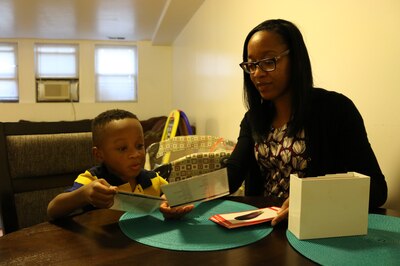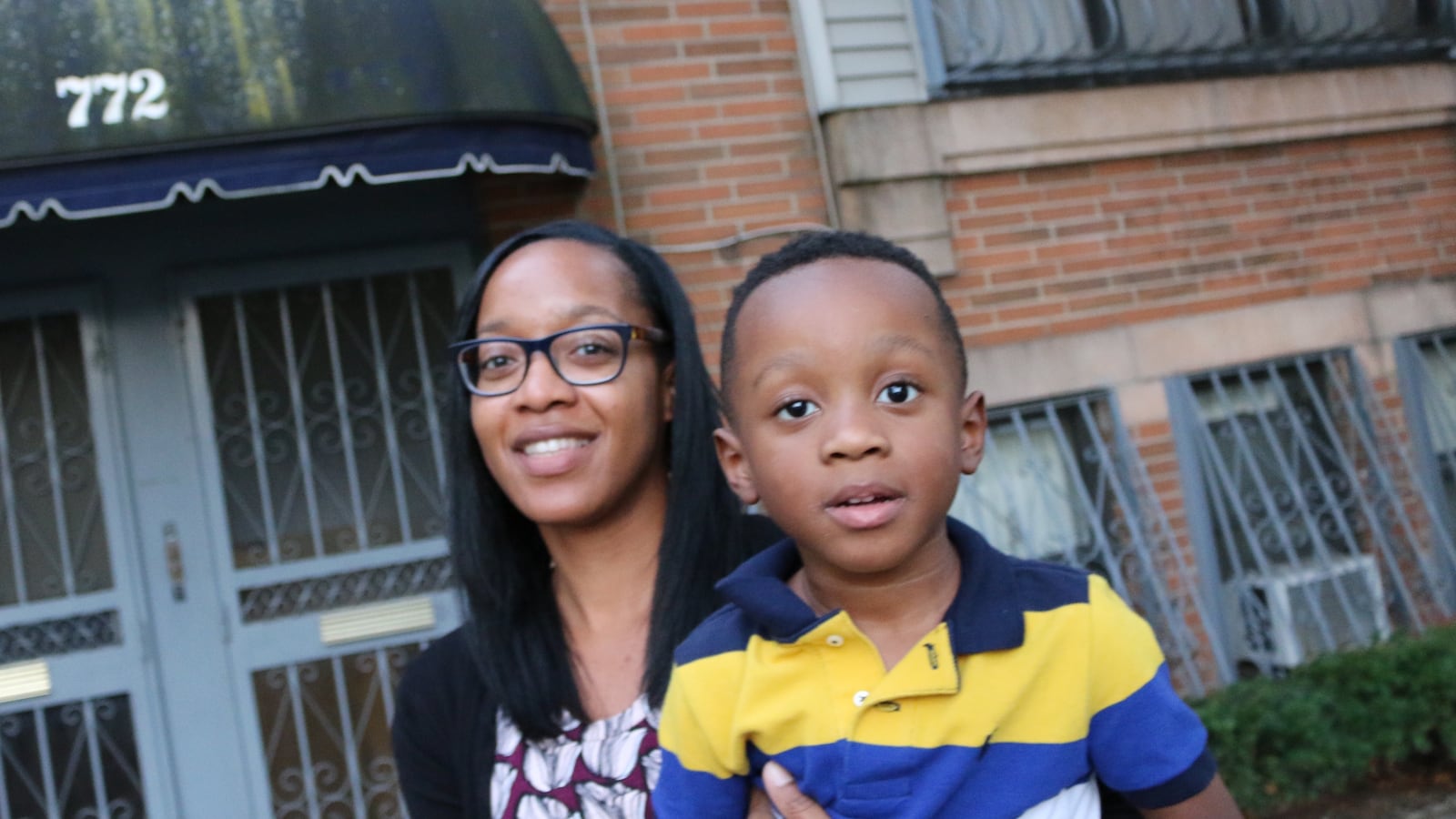Shavon Gilliam realized her son Mikel was different about six months after his first birthday.
His speech wasn’t developing like most other kids his age, and he didn’t seem to grasp how certain toys worked. “Like a big toy truck — he would turn it upside down and just play with the wheels,” Gilliam said. And even more worrisome: “He wasn’t even attempting to talk.”
After an early evaluation revealed Mikel was likely on the autism spectrum, Gilliam was able to secure early intervention services to help address his developmental delays. But once Mikel turned three and was no longer eligible for early intervention, Gilliam tried to enroll him in several programs near their Bronx neighborhood that offer special education preschool services.
She kept hearing the same thing: There are no spots left. So Mikel spent six months at home, occasionally visiting the aquarium and the library with his grandmother. “He didn’t get services right away,” Gilliam said. “He was just home for a while without anything.”
Mikel isn’t alone.
Across the city, parents of children with disabilities have struggled to find spots in preschool programs that offer the specialized services the city is required to provide. The city no longer releases the number of students waiting for services, though it has in the past.
But special education providers say a crisis is looming as years of flat state funding — and competition with the city’s pre-K programs — have made it increasingly difficult to keep their doors open.
“The city has expanded Pre-K For All and sought to ensure there is a prekindergarten seat for every child in the city,” said Randi Levine, an early childhood expert at Advocates for Children, which worked on Mikel’s case. “Parents, advocates, and providers are concerned that we have not done enough to ensure there is a preschool seat available for every preschooler with a disability who needs one.”
‘This is very concerning’
While thousands of students with disabilities are served in traditional preschool programs, including Pre-K for All, those with more complicated disabilities are eligible for preschool programs by age three that offer smaller class sizes and access to more specialized therapies. To meet these needs, the city contracts with private providers, who served roughly half of the city’s 32,000 preschoolers with disabilities as of June.
Quality Services for the Autism Community is one of those providers. Lisa Veglia, its deputy executive director, said she usually has open seats in September. Not this year.
“We are full now and have a waitlist of about 17 kids,” said Veglia, whose organization runs a program for 88 preschoolers on the autism spectrum in Douglaston, Queens. “That has never happened.”
Providers across the city have reported increasing demand for special ed preschool, and there appear to be shortages affecting entire boroughs.
In one case, the city told a parent there were no seats available for a six-student special education class anywhere in Queens, Levine said, even though that is the type of program listed on the child’s individualized education plan. In the meantime, that child is at home and receiving no services. The family declined to be interviewed for this story and the Department of Education declined to comment on the specific situation.
“This is very concerning, as it is only September, and six-student classes are commonly recommended for preschoolers with more severe cases of autism,” Levine wrote in an email to Chalkbeat, noting that more students are often identified as needing services as the school year progresses.
On Staten Island, the Early Childhood Direction Center, which fields inquiries from parents navigating the process, said they too have heard from families who are having trouble finding preschool placements.
“There’s an increased demand for families of children with more intense needs who seek more restrictive settings and services than is currently available,” said Laura Kennedy, director of Staten Island’s ECDC.
And United Cerebral Palsy of New York City, which serves more than 400 preschool students with disabilities across four boroughs, making it one of the city’s biggest providers, has also seen a spike in demand.
When they recently opened two new classes, “[We] are filling them practically overnight because there are no seats left,” said Marianne Giordano, a vice president at UCP. “There’s not enough programs to meet the needs of all the children with disabilities out there.”
The city’s education department did not deny that there are shortages for preschool special ed programs across the city, but largely declined further comment.
“We are dedicated to ensuring the individual needs of students with disabilities are met and work closely with families to provide an appropriate placement that provides a supportive learning environment for each student,” spokeswoman Toya Holness wrote in a statement.
Still, providers and advocates say many preschoolers with disabilities are unable to find seats. But figuring out exactly how many is more complicated than it seems.
As recently as 2014, the city gave service providers what was known as a “Pupil in Need” list that showed how many preschool students were waiting for the services that had been promised on a student’s individualized education plan. An old version of that list, which included month-by-month breakdowns, showed that anywhere from dozens to hundreds of students waited for seats at various points throughout the year, though the city has since stopped publicly releasing it.
The city’s Department of Education did not answer questions about why it stopped releasing those numbers. The department also did not comment on how many students are currently waiting for services, and declined interview requests. (A spokesperson wrote via email that they have “effective methods of communicating with relevant programs to notify them of individual students who are awaiting placement.”)
But even in the absence of hard numbers, there are other signs of shortages. This year, for instance, the State Education Department has asked for applications from providers to open more special education preschool programs in every borough “to address the specific regional need.” And while the state declined to comment for this story, a 2014 state report warned that funding shortfalls “may ultimately affect the quality and availability of preschool special education services.”
‘Finding it difficult to operate’
In an ironic twist, shortages of special education seats could partly be an unintended consequence of the city’s promise to offer a free seat to every child.
Since the city can pay thousands more in salary and benefits compared with the private preschool providers (whose funding is controlled by the state), special education programs face stiff competition for staff from the city’s own pre-K program, and many experience constant teacher turnover.
On average, privately operated preschool special education providers often pay between $20,000 and $30,000 less than the education department’s preschool programs, salary data show, which makes it difficult to retain experienced teachers, a problem that also exists among Pre-K for All providers.
“Last year, with the expansion of universal pre-K, we lost our staff in droves,” said Carol Verdi, a vice president at HeartShare Human Services, which runs three early childhood centers in Queens and one in Brooklyn. Her agency experienced roughly 50 percent staff turnover from last year to this year. “You can’t fault people for leaving to make their lives better, but we are at real risk for not being able to run our programs with qualified staff.”
Verdi’s staff losses may seem extreme, but in a survey conducted by the Interagency Council of Developmental Disabilities Agencies, 30 preschool special ed providers reported losing an average of 32 percent of their certified teachers in the second half of 2015, and 23 percent of their teaching assistants. In a more recent 2016 survey, providers continued to report dramatic rates of staff turnover.
“We have some programs right now that don’t even have enough staff to operate all their classrooms,” said Chris Treiber, a director for children’s services at the Interagency Council, which represents providers. “Those programs are going to close, and no one is going to take those kids. The children with the highest level of need — there aren’t going to be those services available.”
‘A dark cloud’
Competition with Pre-K for All is not the only problem. The private providers that offer special education preschool claim that their funding has not kept up with costs.
“They have gone a long time without any significant increase in their reimbursement rate and some of them are finding it difficult to operate,” said Levine. “And we’ve seen some programs close down as a result.”
Many of the providers say there’s a simple solution to this problem: a funding increase from the state.
For six of the past eight years, special education preschool programs received no funding increases. In the last two funding cycles, the providers got a 2 percent bump each year — roughly half the increase that similar school-age special education providers received.
The years of flat funding coincided with a wider state freeze for many human services providers. But state policymakers had another reason to choke financing: Special education preschool costs have soared, and a series of high-profile audits revealed that some providers misspent money on lavish vacations and executive salaries, which ultimately led to criminal charges. (For his part, Treiber said his association has supported legislation requiring stricter financial oversight.)
“It put a dark cloud over the whole industry and there were definitely some bad apples,” said Verdi, the vice president at HeartShare Human Services, which runs special ed preschool programs. “And as a result, we get painted with the same brush.”
The funding crunch, she said, has meant that her organization has started running $800,000 annual operating deficits on its preschool special education programs alone. “If my deficits keep going up, our board has told me that we don’t know how long we can continue to fundraise to offset the deficit.”
‘He’s not there yet’
Shavon Gilliam has felt the impact of the shortage firsthand. After struggling to find Mikel a special education preschool program for six months, she finally found a seat this September with help from Advocates for Children.

She acknowledges that part of why she didn’t get a preschool placement immediately is that she only started looking for a program in March. “That was my lapse in judgment,” she said. Still, even though Mikel’s individualized education plan called for a full-time special ed class, for months the city was only able to provide three hours per week of home-based therapy.
On a recent Friday evening, Gilliam sat with her son in their ground-floor apartment running through flashcards with different meats, fruits, and vegetables pictured on them.
She was proud that he could correctly identify the names and colors of the images in front of him, but wondered whether he’d be further along if he had received services sooner.
“I think he would be saying more phrases by now,” Gilliam said. “Right now he should be saying paragraphs. He’s not there yet.”

